About us
Music with an O
MOSÏK plays moustache jazz based on the ideas of the forgotten German music philosopher Trude Tulpenthal, who described her sonic ideal as »music with an O from a mosaic without an A«. The attempt at a holistic approach to this creed is the guiding maxim of MOSÏK.
The project has its roots in the duo of »Mademoiselle Klarinet« Susann Stephan and »Monsieur Gitar« Romain Trudeau.
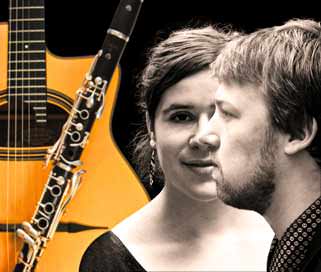
Since especially »Basso« and »Drummel« ranked among Tulpenthal’s favorite instruments, MOSÏK can be heard mainly in trio or quartet line-up these days.
For »the full blast-off« very special guests on completely normal instruments sometimes join in, among which »Violino«, »Armonika« or another »Gitar« stand out.
In all these »ingeniously composed line-ups«, MOSÏK follows Trude Tulpenthal’s desire for a »world of jazz for people who love or hate jazz« – to the rest it »doesn’t matter anyway«.
At the same time, MOSÏK is also influenced by Tulpenthal’s rather unconcerned attitude towards »jazz fuss and ethno lounge«: the mosïkal journey begins beyond academies and label lobby at the »origin of all inter-musical understanding«, the musique Manouche, the so-called Gypsy jazz.
Within this distinct genre between folk and art music, MOSÏK spontaneously and freely improvises on »swingingly related, not-so-well-known treasures from the Gypsy moustache«.
The outcome is MOSÏK »à la Django: rich and hard instead of poorly softened« – nothing canned, and certainly not for the museum. Rather shockingly mosïkal, sometimes even more than exciting. Listen and hear for yourself!
About Trude Tulpenthal
Mosaic without an A
Trude Tulpenthal was a German music philosopher of the 20th Century. She spent her final years in Halle (Saale), where she lived in the wooden parlor of the city’s oldest inn »Goldene Rose«.
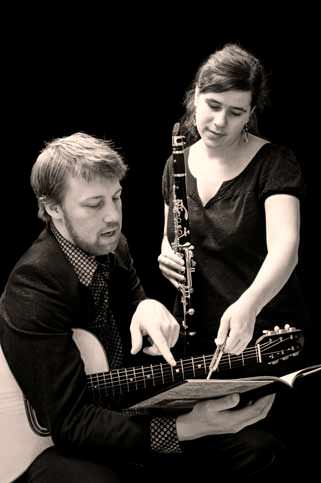
Since their records are written to a large extent in an extinct gibberish dialect, with influences from the Sorbian, Yiddish and the Romani language, a translation is considered extremely difficult, sometimes even impossible due to their often fragmentary nature. With a reasonable degree of certainty, it can be said that she preferred the orally transmitted playing styles of the families of Sinti musicians Reinhardt, Rosenberg & Schmitt. A special devotion of her for the Belgian guitarist Django Reinhardt rates as assured.
Many of Trude Thulpenthal’s findings still remain universally valid, such as »Sini Swing is not an electronic sound art, but an acoustic art of sound« or »As a matter of fact, Gypsy Jazz isn’t anything to nibble on – whereat its crispy crust starts crunching as soon as the rhythm is pumping and the wood is shredding«.
As a woman, her ideas gained poor attraction in her early years. So it occurred to her to impersonate a man, whereupon she called herself henceforth Trudo and grew a moustache.
Unfortunately, she unexpectedly suffered a stroke at one of her afternoons fishing on Saale river island Peissnitz shortly afterwards, the consequences of which led to her death at the age of only 43 years.
Mosïkians
Mosïk in their veins
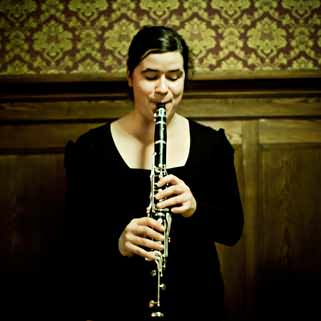
- Susann Stephan
- Klarinet, Saxo
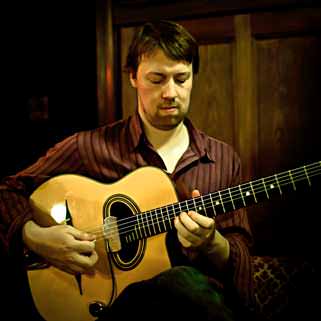
- Romain Trudeau
- Gitar
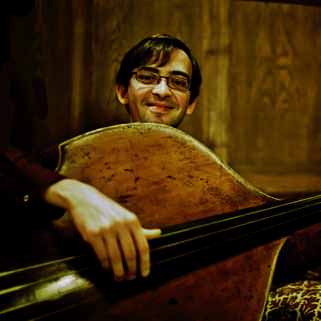
- Ben Hohlfeld
- Basso
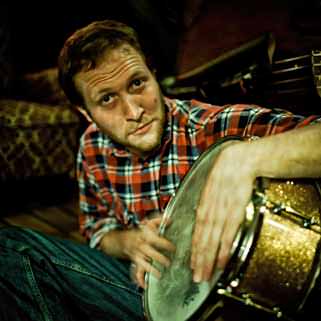
- Johannes Sens
- Drummel
Possibilities
The sound of MOSÏK
MOSÏK is versatile and variable. In small and large format they serve concertante ear-candy, invite you to dance or create musical ambience (musique d’ameublement).
Along the lines of Gypsy jazz, which was so highly esteemed by Tulpenthal, MOSÏK intertweanes European, Oriental, African and Latin American influences into a dazzling tapestry of sound, whose nodes they relink at every performance – always driven by the mosïkal pulse which directly reaches the heart.
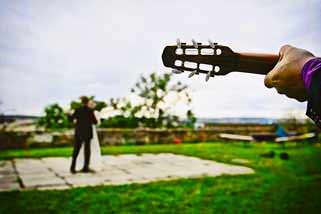
At their concerts MOSÏK arouses the very same emotions that Trude Tulpenthal recognized in her observations on the effect of Jazz Manouche on the audience: »The earlobe bops, the jaw drops, the gypsy moustache hops!« In honor of Thulpenthal MOSÏK regularly plays alongside their performances abroad in the inn »Goldene Rose« of Halle (Saale) in Saxony-Anhalt, Germany, where the music philosopher lived until her death. Those who want to listen to the MOSÏK at the source of their inspiration and want to experience them seeking after the aesthetic concept of Tulpenthal first hand, should not miss a visit with a warm welcome to the »Gypsy Jazz Klub!«
In addition, MOSÏK accepts a growing number of invitations to private parties – weddings, anniversaries, birthdays, family gatherings or private parties have become a familiar terrain for the well-traveled mosïkians. Here, the MOSÏK can unfold in a very intimate way to reach their audience very directly.
What’s more, MOSÏK also can enhance business representations on corporate events. MOSÏK has the competence to not only give an event that certain »je ne sais quoi«, but to create that unique moment which guests and organizers will gladly remember quite often.
FAQ
Mosïk to the ears
- Klarinet, Gitar, Basso, Drummel – what the heck are these instruments?
- These special designations stand for ordinary instrument names and are borrowed from the gibberish dialect of Trude Tulpenthal. Their English equivalents are: Klarinet – clarinet, Gitar – guitar, Basso – double bass, Drummel – drums and percussion, Armonika – accordion, Violino – violin, Saxo – saxophone. To indicate the instrumentalists, Tulpenthal used to put Mademoiselle or Monsieur before the instrument name.
- How long have you been making music together?
- Susann and Romain have been playing together as a duo since 2005. Since 2011, we regularly perform as a quartet with bass and drums. Besides, varying formations have arisen in the course of time, with accordion, violin and vocals among others. Some still join in regularly as guest mosïkians.
- Do you play on private events?
- Yes, of course we do! It is wonderful to create musical moments that are positively remembered over the years by hosts and guests. Often we meet our hosts again – when we play on the festivity of their friends…
- I live very far away. Can you still come?
- Up till now, our venues have been as rich in variety as the MOSÏK we play. Be it a Swiss alp or a holm in the North Sea, we were invited to so many beautiful locations: a backyard near Cologne, a street festival in Nuremberg, a greenhouse in the Black Forest, a bar in Berlin, a castle in Brandenburg, Leipzig airport or regularly the oldest inn of Halle (Saale). In short: Yes – we get anywhere you want to hear us!
- What do you need on site?
- Since we won’t play anything canned, we definitely won’t need a can opener. We can bring our own amplification. At smaller events, we can also play »unplugged«, i.e. without any amplification. We do not need a stage, but you should allow at least 1.5 m2 of space per mosïkian. Otherwise, we need one to three chairs without armrests (depending on the line-up) and an electrical outlet within reach. For larger venues and concert promoters, we have a technical rider.
- How much is the MOSÏK?
- MOSÏK is free but not for free. We live to make MOSÏK and make MOSÏK for a living. Each performance and each event is unique and will be treated by us as such. Therefore we seek the personal dialogue for discussing the details, based on which we can make an offer. Please ask us directly!
Discography
MOSÏK makes Musik
Wilhelm (2013)
In search of new colors for old treasures of the Gypsy Jazz repertoire, MOSÏK followed the splendor of the »Goldene Rose«, thereby encountering the second son of Trude Tulpenthal. His review: »Honest, genuine and unashamed – the mix is right. Big sounds from a small orchestra!«
- Susann Stephan – Klarinet, Saxo
- Romain Trudeau – Gitar
- Ben Hohlfeld – Basso
- Johannes Sens – Drummel
Johann (2008)
A journey through the world of Swing Manouche, Valse Musette and Yiddish Klezmer in memory of Trude Thulpenthal’s missing son, Johann, whose patron was none other than Jean »Django« Reinhardt, the father of European jazz.
»Music at the highest level
« – hotclubnews.de
- Susann Stephan – Klarinet
- Romain Trudeau – Gitar
- Wolfgang Singer – Violino
- Marcus Stadler – Armonika, Basso
- Peter Häseler – Basso
Order form
MOSÏK inside
Contact
Where the MOSÏK is
For inquiries of any kind, please use the contact form or refer to:
For press and promoters:
All quotations used in the text are taken from the unsorted writings of Trude Tulpenthal
Photos by Matthias Ritzmann, Lhagva Sanchin, René Mattner, Jürgen Domes & Very Barth
All content © MOSÏK 2025
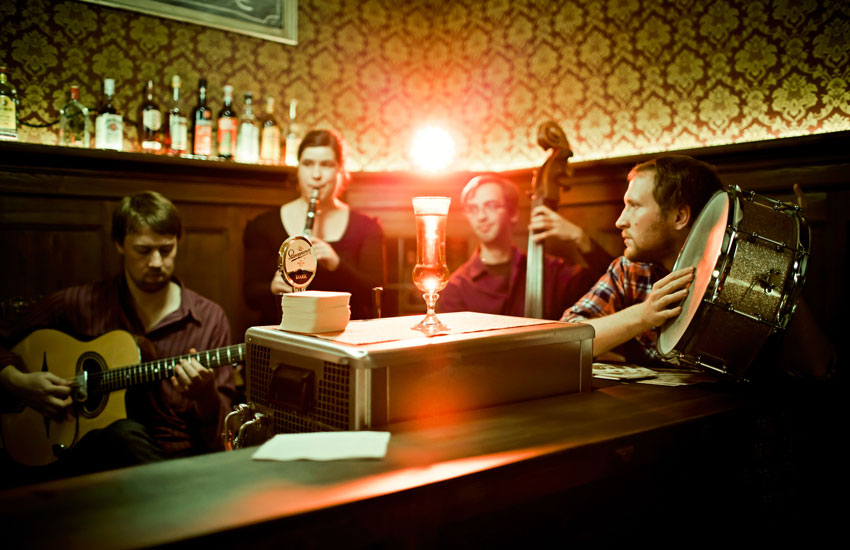
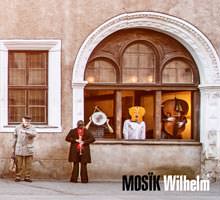
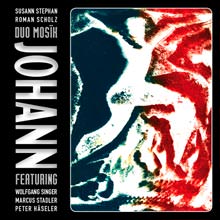
MOSÏK on the web: